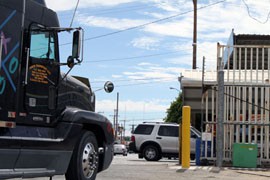Cronkite News has moved to a new home at cronkitenews.azpbs.org. Use this site to search archives from 2011 to May 2015. You can search the new site for current stories.
Five months later, pilot program has seen little cross-border trucking
Editor’s Note: A previous version of this story incorrectly characterized one of the groups quoted on the issue. The Owner-Operator Independent Drivers Association is a trade association.
WASHINGTON – Five months after the U.S. and Mexico ended a stalemate on long-haul international trucking, the agreement has led to a handful of cross-border deliveries – all by the same truck.
The Department of Transportation has so far approved only one company, Transportes Olympic of Apodaca, Mexico, along with one of its trucks and two of its drivers, under the pilot project that lets Mexican trucks haul deep into the U.S. As of Nov. 27, that truck had made seven deliveries.
Two other Mexican companies, Grupo Behr and Moises Alvarez Perez, have passed preliminary safety inspections, and their applications are pending in a public comment period. Three Mexican shippers are awaiting safety screenings, and 10 others have applied.
No U.S. transportation company is in any of those stages.
The agreement signed July 6 ended a two-year standoff between the two countries over U.S. trade rules that made it impossible for Mexican trucks to make deliveries beyond a short-range “buffer zone” near the border. The signing also ended more than $2 billion in annual tariffs that Mexico had imposed on American goods in retaliation for the trucking restrictions.
The pilot project is scheduled to last 18 months but can be extended to three years.
Truckers unions and some trade associations have stood against the project, saying it threatens to replace American drivers with cheaper Mexican labor. Proponents of the pact counter that if the pilot fails, reimposed Mexican tariffs could force exporters to shed tens of thousands of U.S. jobs.
Joe Rajkovacz, a board member of the Owner-Operator Independent Drivers Association, said at least 20 trucking companies will need to be approved before officials can consider extending the 18-month program into a permanent arrangement.
A “statistically valid sample” must be available to determine that the agreement was a success, according to the final clause of the memorandum of understanding that created the pilot project.
“They’ve got a pretty tough mountain to get over if all they have is two or three companies,” Rajkovacz said.
Rajkovacz’s trade association, along with labor unions such as the Teamsters, says the agreement undercuts American drivers by allowing companies to use cheaper Mexican labor.
“The politics of this has been driven by large multinational American carriers,” Rajkovacz said. “They want to avoid a lot of the workplace costs on unemployment and workers’ compensation.”
But business groups such as the Western Growers Association are more concerned by an estimated $2.4 billion in annual tariffs Mexico would impose without an open border, said Ken Barbic, federal government affairs director for the group.
“We were excited to see that agreement between the Mexican government and the U.S. government,” Barbic said. “We were excited when we saw that the tariffs were being lifted.”
Returning those tariffs to U.S. exporters could result in the loss of about 25,000 jobs from the U.S. economy, the U.S. Chamber of Commerce has estimated.
Barbic said the trucking program has not yet raised any worries from his standpoint, but he is watching Congress to make sure no legislative action is taken to stop it.
“We remain hopeful that opponents of that agreement will not seek to derail it,” he said.
A similar agreement has been derailed before.
From 2007 to 2009, 101 trucks representing 27 companies were allowed to cross from Mexico. It was the U.S. termination of that program that led the Mexican government to levy billions of dollars in tariffs on American goods.
Mexico gradually lifted those fees, beginning when its transportation minister and U.S. Transportation Secretary Ray LaHood signed the latest agreement on July 6. Mexico cut the tariffs fully when Transportes Olympic’s application was approved in October.
Because the current program can be extended to three years, both Rajkovacz and Barbic said it is too early to predict a success or failure – for the program or its opponents.
“Next year, we’ll have a better idea,” Barbic said. “Right now, it’s too soon to tell.”







